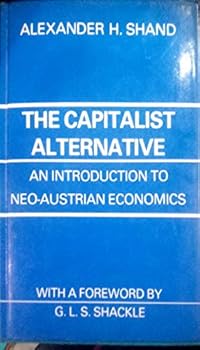The Capitalist Alternative: An Introduction to Neo-Austrian Economics
Select Format
Select Condition 
Book Overview
Book by Shand, Alexander H. This description may be from another edition of this product.
Format:Hardcover
Language:English
ISBN:0814778364
ISBN13:9780814778364
Release Date:August 1984
Publisher:New York University Press
Length:242 Pages
Weight:1.05 lbs.
Customer Reviews
1 rating
Sympathetic but Balanced Review of Austrian Economics
Published by Thriftbooks.com User , 19 years ago
The "Austrian" school of economics long ago left Austria and migrated to the American Sunbelt, where it is taught nowadays in places like Santa Monica, Las Vegas, and Auburn. Austrians are extreme libertarians who have many suggestive things to say about market processes, entrepreneurship, monetary theory, and the business cycle. Unfortunately, they rarely test their speculations by doing empirical research, because they view economics as an "axiomatic" discipline based on the metaphysics of human action. Some Austrians act as if Ludwig von Mises and Murray Rothbard had the last word on economics in the 1960s. Since they don't test their theories, Austrian economists tend to shun scholarly journals and rarely engage with mainstream economists. Instead, they argue for Austrianism by citing first principles and heaping abuse on non-Austrians (Mises was especially vitriolic). Many Austrian economists occupy themselves by writing popular and not-so-popular restatements of economic principles. Others proselytize and pen polemical essays for the internet. Still others analyze the feasibility of anarchism or defend monarchical theories of government. The whole school inhabited something of an intellectual ghetto until it was rescued by the rise of Reagan and Thatcher after 1980. Readers interested in an overview of Austrian economics but too busy to slog through 800-page tomes by Mises or Rothbard should turn to this compact, clearly-written book by A.H. Shand. It reviews the main areas of contention between Austrians and neo-classical economics, and situates Austrian thinking within the history of economics. Shand is broadly sympathetic to Austrian approaches, especially those of F.A. Hayek -- a rare Austrian who combined economic talent, good manners, a knowledge of history, and philosophical sophistication. However, Shand isn't blind to the Austrian school's omissions, exaggerations, and occasional manias (such as Mises' obscurantist opposition to mathematics). His analysis is balanced and non-dogmatic. His book is over 20 years old but this doesn't matter because Austrians have had little new to say since Hayek died. Maybe this isn't surprising for a school that believes that everything worth knowing about economics has already been discovered.






